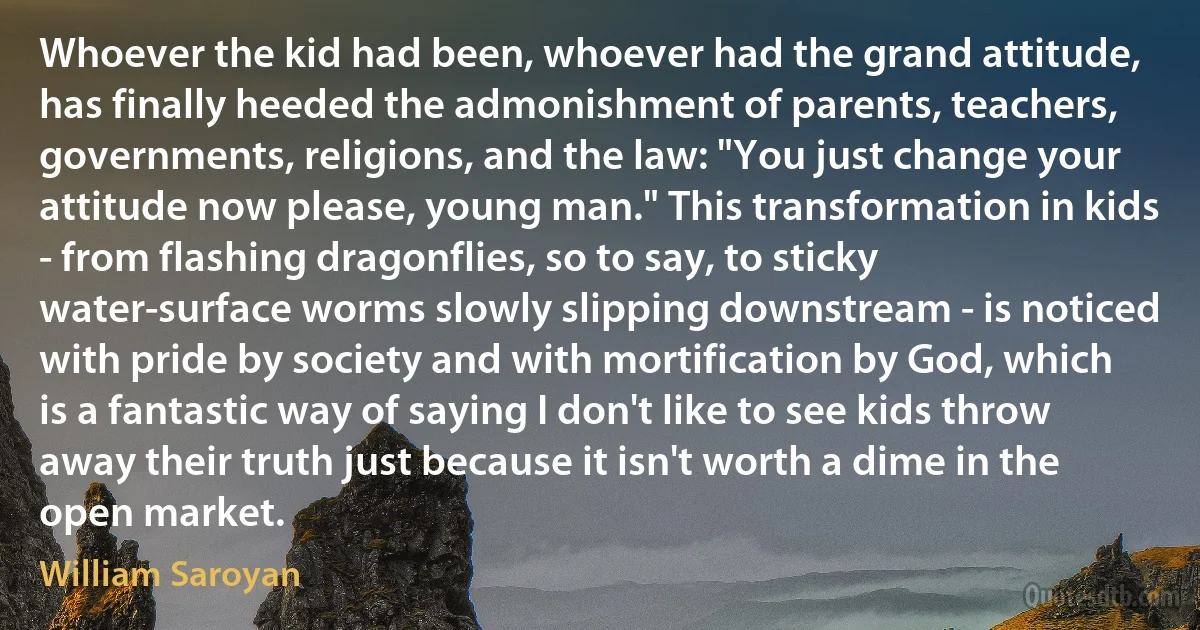William Saroyan quotes - page 8
I have been fascinated by it all, grateful for it all, grateful for the sheer majesty of the existence of ideas, stories, fables, and paper and ink and print and books to hold them all together for a man to take aside and examine alone. But the man I liked most and the man who seemed to remind me of myself - of what I really was and would surely become - was George Bernard Shaw.

William Saroyan
In the time of your life, live - so that in that good time there shall be no ugliness or death for yourself or for any life your life touches. Seek goodness everywhere, and when it is found, bring it out of its hiding-place and let it be free and unashamed. Place in matter and in flesh the least of the values, for these are things that hold death and must pass away. Discover in all things that which shines and is beyond corruption. Encourage virtue in whatever heart it may have been driven into secrecy and sorrow by the shame and terror of the world.

William Saroyan
One day, back there in the good old days when I was nine and the world was full of every kind of magnificence, and life was still a delightful and mysterious dream, my cousin Mourad, who was considered crazy by everybody who knew him except me, came to my house at four in the morning and woke me up by tapping on the window of my room.

William Saroyan
I believed from the beginning of remembered experience that I was somebody with an incalculable potential for enlargement, somebody who both knew and could find out, upon whom demands could be made with the expectation of having them fulfilled.
I felt at the same time, and pretty much constantly, that I was nothing in relation to Enormity, the Unknown, and the Unknowable.

William Saroyan
Death is not an easy thing for anyone to understand, least of all a child, but every life shall one day end. But as long as we are alive, as long as we are together, as long as two of us are left, and remember him, nothing in the world can take him from us. His body can be taken, but not him.

William Saroyan
The writer is a spiritual anarchist, as in the depth of his soul every man is. He is discontented with everything and everybody. The writer is everybody's best friend and only true enemy - the good and great enemy. He neither walks with the multitude nor cheers with them. The writer who is a writer is a rebel who never stops.

William Saroyan
I am interested in madness. I believe it is the biggest thing in the human race, and the most constant. How do you take away from a man his madness without also taking away his identity? Are we sure it is desirable for a man's spirit not to be at war with itself, or that it is better to be serene and ready to go to dinner than to be excited and unwilling to stop for a cup of coffee, even?

William Saroyan
There is a small area of land in Asia Minor that is called Armenia, but it is not so. It is not Armenia. It is a place. There are only Armenians, and they inhabit the earth, not Armenia, since there is no Armenia. There is no America and there is no England, and no France, and no Italy. There is only the earth.

William Saroyan
When I was fifteen and had quit school forever, I went to work in a vineyard near Sanger with a number of Mexicans, one of whom was only a year or two older than myself, an earnest boy named Felipe. One gray, dismal, cold, dreary day in January, while we were pruning muscat vines, I said to this boy, simply in order to be talking, "If you had your wish, Felipe, what would you want to be? A doctor, a farmer, a singer, a painter, a matador, or what?" Felipe thought a minute, and then he said, "Passenger." This was exciting to hear, and definitely something to talk about at some length, which we did. He wanted to be a passenger on anything that was going anywhere, but most of all on a ship.

William Saroyan
Then swiftly, neatly, with the grace of the young man on the trapeze, he was gone from his body.
For an eternal moment he was still all things at once: the bird, the fish, the rodent, the reptile, and man. An ocean of print undulated endlessly and darkly before him. The city burned. The herded crowd rioted. The earth circled away, and knowing that he did so, he turned his lost face to the empty sky and became dreamless, unalive, perfect.

William Saroyan
I cannot see the war as historians see it. Those clever fellows study all the facts and they see the war as a large thing, one of the biggest events in the legend of the man, something general, involving multitudes. I see it as a large thing too, only I break it into small units of one man at a time, and see it as a large and monstrous thing for each man involved. I see the war as death in one form or another for men dressed as soldiers, and all the men who survived the war, including myself, I see as men who died with their brothers, dressed as soldiers. There is no such thing as a soldier. I see death as a private event, the destruction of the universe in the brain and in the senses of one man, and I cannot see any man's death as a contributing factor in the success or failure of a military campaign.

William Saroyan



